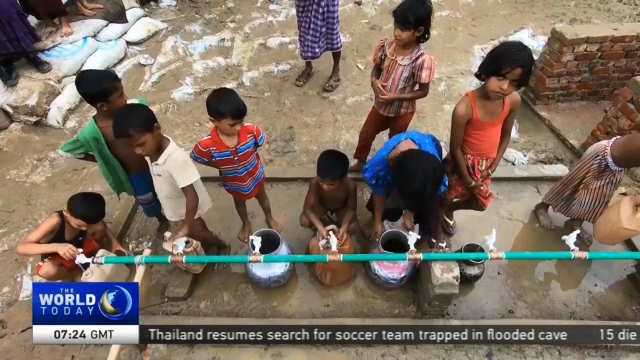
15:47, 26-Jun-2018
Drinking Water Not Enough: Potable water a challenge in Rohingya camps in Bangladesh
Updated
15:13, 29-Jun-2018
03:15

Finding safe drinking water is a huge challenge in Rohingya refugee camps in Bangladesh. Most rely on wells or rivers. But it's not enough as Ravinder Bawa reports.
Noor Bahar's daily trips to this water point are unending. This is an added responsibility since she and her family were forced to migrate from Myanmar to Bangladesh. Due to an erratic water supply, she has to prioritize the use of water for drinking and cooking over other needs. Since she has fewer containers to store water, she has to fill water at least four to five times a day.
NOOR BAHAR, REFUGEE UNCHIPRANG, COX'S BAZAR "People who have vessels to store are better off but others who do not have are suffering. We have to bathe once in three days. We don't have water to wash clothes. We do not get enough water for our daily needs."
This is a common story in the refugee camps. Mostly women children are seen at water points or tube wells. For them, every drop of water is precious, as they have survived without water for days when they arrived here last year in August. Two types of tube wells meet their needs- some are seven hundred feet deep and others just forty feet. Now with the arrival of monsoon, rain water also forms an important source.
SHOMBHU NATH SAHA, WASH OFFICER BALUKHALI, COX'S BAZAR "The amount of water that is needed is not available here. There are not enough tube wells in these camps to meet the water demands of the people. So to make the available water safe for drinking, we had to introduce new methods and we now distribute chlorine tablets."
Every family gets 140 chlorine tablets per month. These tablets help them to treat water at the household level. Refugees have been trained to use these tablets for purifying water. Mohammed Shoaib, went through one such training and offered to show us how they use tablets to make water safe for drinking at home.
MOHAMMED SHOAIB, REFUGEE BALUKHALI, COX'S BAZAR "Now that they are giving us medicine. We are somehow managing our drinking water needs. Those who get the medicines are managing but there are others who do not have access to these tablets, they are in great difficulty. They have to drink water which has iron contamination. We need more tube wells here which are dug deep beyond 700 feet."
Despite various efforts, the availability of safe drinking water is a huge challenge in the camps. Children are the most vulnerable to diseases spread due to water contamination. Little do they know that the water they play with could be fatal if contaminated?
RAVINDER BAWA UNCHIPRANG, COX'S BAZAR, BANGLADESH "Even as monsoons are chaotic in rohingya camps, they are a saving grace in areas where there is water shortage as the people store rain water and use it abundantly without worrying about collection from water points. But once the monsoon is over, their struggle will begin again."

SITEMAP
Copyright © 2018 CGTN. Beijing ICP prepared NO.16065310-3
Copyright © 2018 CGTN. Beijing ICP prepared NO.16065310-3